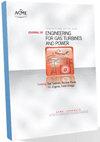Fluid Dynamic Behaviour of Conventional and Pressure Relieving Brush Seals
IF 2.1
4区 工程技术
Q3 ENGINEERING, MECHANICAL
Journal of Engineering for Gas Turbines and Power-transactions of The Asme
Pub Date : 2023-10-16
DOI:10.1115/1.4063775
引用次数: 0
Abstract
Abstract Brush seals consist of a static ring of densely packed, flexible, fine wire bristles that provide resistance to the flow. Pressure relieving brush seals can be employed to overcome issues such as hysteresis that affect seal durability by reducing friction between the bristle pack and back plate surface. The impact of such designs on the fluid dynamic behaviour of brush seals was studied following a concomitant methodology that exploited the benefits of both engine representative and large-scale testing facilities. Leakage data were fitted using a porous medium model found in the literature to quantify viscous and inertial resistance coefficients. Shaft rotation was shown to cause a reduction in seal leakage and an increase in static pressure on the back plate surface. The pressure relieving back plates also resulted in increased static pressures at this location, causing a reduction in flow resistance that increased leakage through the porous bristle pack. Interrogation of the large-scale inter-bristle pressure field for the two back plate designs revealed the distributions of axial pressure diverged towards the rear of the bristle pack. The detail gathered using the large-scale study has been shown to be representative, hence the insight is generically applicable to brush seals.传统和减压刷式密封的流体动力学特性
刷密封由一个静态环密集的,灵活的,细线刷毛,提供阻力流动。减压刷式密封可以通过减少刷毛包与背板表面之间的摩擦来克服影响密封耐久性的滞后等问题。这种设计对刷式密封件流体动力学特性的影响是根据一种附带的方法进行的,该方法利用了发动机代表性和大型测试设施的优势。泄漏数据使用文献中发现的多孔介质模型进行拟合,以量化粘性和惯性阻力系数。轴的旋转减少了密封泄漏,增加了背板表面的静压。减压后板还导致该位置的静压增加,导致流动阻力降低,从而增加了通过多孔刷毛包的泄漏。对两种后板设计的大尺度猪鬃间压力场进行了分析,揭示了轴向压力向猪鬃包后部发散的分布。使用大规模研究收集的细节已被证明具有代表性,因此该见解一般适用于刷状密封。
本文章由计算机程序翻译,如有差异,请以英文原文为准。
求助全文
约1分钟内获得全文
求助全文
来源期刊
CiteScore
3.80
自引率
20.00%
发文量
292
审稿时长
2.0 months
期刊介绍:
The ASME Journal of Engineering for Gas Turbines and Power publishes archival-quality papers in the areas of gas and steam turbine technology, nuclear engineering, internal combustion engines, and fossil power generation. It covers a broad spectrum of practical topics of interest to industry. Subject areas covered include: thermodynamics; fluid mechanics; heat transfer; and modeling; propulsion and power generation components and systems; combustion, fuels, and emissions; nuclear reactor systems and components; thermal hydraulics; heat exchangers; nuclear fuel technology and waste management; I. C. engines for marine, rail, and power generation; steam and hydro power generation; advanced cycles for fossil energy generation; pollution control and environmental effects.

 求助内容:
求助内容: 应助结果提醒方式:
应助结果提醒方式:


